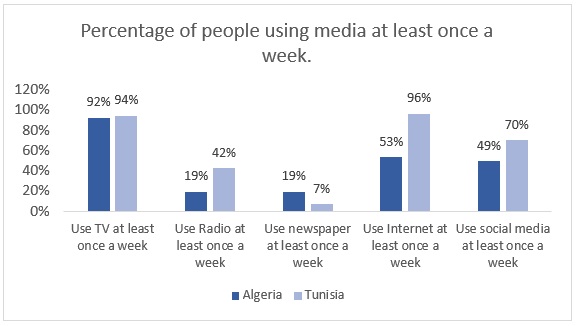In a nutshell
Some but not all mass media are likely to encourage people to vote in elections.
Newspaper consumption has a positive impact on people’s intention to vote; TV consumption has no significant impact.
There is a positive impact of radio consumption on the intention to vote in Tunisia, but not in Algeria.
In a recent study, I examine the impact of mass media on voting behaviour in Algeria and Tunisia (Merouani, 2019). Analysing data from BBC Media Action surveys, I show that some but not all media are likely to encourage people to vote in the two countries.
The data come from two representative surveys in early 2018, which covered 3,000 households in Algeria and 1,000 households in Tunisia. Only young people (those aged 16-35) were included in the Tunisian sample.
The surveys measured some socio-demographics of the respondents (age, education, location, etc.), and a set of media consumption and media habits variables. They also measured variables about respondents’ intention to vote in the next presidential/municipal election. Asked ‘How likely are you to vote in the presidential/municipal elections?’, respondents could answer: very likely; somewhat likely; neither; somewhat unlikely; very unlikely; don’t know; or refuse to answer.
The results show that access to media is heterogeneous across the two societies. While access to TV is almost universal (99% in both countries), access to other mass media is still low. For example, 50% and 60% of respondents say that they have access to radio in Algeria and Tunisia, respectively. Access to newspapers seems to be lower in Tunisia (10%) compared with Algeria (53%). Access to the internet also varies: 62% in Algeria and 55% in Tunisia.
When asked about the frequency at which they use media, some respondents said that they use media (very) frequently, while others said that their use was less frequent or that they never use the media. In my analysis, I focus on people who use the media at least once a week.
Figure 1: Percentage of people using media at least once a week
Sources: BBC Media Action household survey.
Figure 1 shows that people are more likely to use TV and the internet compared with other mass media (radio and newspapers). The cross-country comparison shows that using TV is similar in Algeria (92%) and Tunisia (94%).
The findings also show that the Tunisian population is more likely to use radio (42%) compared with Algerians (19%). But Algerians read newspapers more frequently: while only 7% of Tunisian respondents read newspapers at least once a week, the figure for Algeria is 19%. The internet and social media seem more likely to be used in Tunisia, but this may be due to the youth of the Tunisian sample.
The use of mass media may affect people’s behaviour, such as their intention to vote. The results show that 52% of people in Algeria planned to vote in the next presidential elections in 2019. In Tunisia, only 23% of respondents were planning to vote in the next municipal elections. Again, the age of the Tunisian sample could be the principal determinant of this low intention to vote.
To investigate other determinants of intention to vote, my study tests the impact of media consumption on voting behaviour. I examine whether ‘media malaise theory’ is supported by the data from the surveys. This theory claims that the frequency and way of covering political issues by the media (especially TV) could create some cynicism among people and make them less involved in politics.
While media malaise theory is supported by many researchers (Muller, 2010l Schuck, 2017), some studies do not confirm the theory (Newton, 1999). My work goes beyond previous studies and distinguishes between the impact on voting behaviour of four kinds of media – namely TV, radio, newspapers and social media/the internet.
My analysis does not find a significant impact of TV consumption on the intention to vote in both Algeria and Tunisia, which is surprising given that TV is extensively used in the two countries. This result could be explained by media malaise theory.
I would rather argue that this is ‘TV/video malaise theory’ because the next finding of the empirical analysis highlights a positive impact of newspaper consumption on the intention to vote. I find that people who consume newspapers at least once a week are 1.39 and 2.19 times more likely to vote in Algeria and Tunisia, respectively.
This result is in line with Robinson (1976), who blames TV for the way it presents politics. He claims that people for whom TV is a secondary source of information and who use newspapers or other media to be informed are more likely to understand and participate in politics. While he finds a positive impact of reading broadsheet newspapers on political mobilisation, Newton claims that media malaise is due mainly to the content of TV programmes rather than their form.
In light of my results and previous research evidence, I would suggest to policy-makers in Algeria and Tunisia that they review TV programme content and carefully orient them in order to achieve the objective of improving election turnout.
The second striking result of my analysis is the positive impact of radio consumption on the intention to vote in Tunisia. The findings show that Tunisians who listen to the radio at least once a week are 1.34 times more likely to vote in the next municipal election.
But the effect of radio consumption on voting behaviour is not significant in Algeria. There is also no significant impact of using the internet and social media on the intention to vote in either country.
Adding to the impact of the media on voting behaviour, my research highlights the impact of trust in government on the intention to vote. The results show that people who trust government are 1.45 times more likely to vote in Algeria. In Tunisia, the impact is not significant. This suggests that governments and candidates for election should focus on earning the electorate’s trust and confidence.
I also find that people who are actively looking for information are 1.23 and 1.58 times more likely to vote in Algeria and Tunisia, respectively.
Last but not least, my study confirms the impact of a set of socio-demographic variables on people’s willingness to vote. Older and more highly educated people, as well as people who live in rural areas (in Algeria) are more likely to vote. I do not find a significant impact of gender on the intention to vote. These results suggest that mass media and candidates for election should try to convince the young, the less educated and people in urban areas to vote.
To conclude, I note that this research is a first attempt to test media malaise theory and see the impact of media on the intention to vote. I do not pretend that the work is measuring actual turnout because people who say that they will vote will not necessarily do so when an election is called. But this evidence could inform candidates and media (especially TV channels) about the potential electorate and help them to shape their programmes so that they increase turnout.
Further reading
Müller, Lisa (2010) ‘Can mass media mobilize and empower voters in elections? A multi-level analysis of established democracies’.
Merouani, W (2019) ‘The Impact of Mass Media on Voting Behavior: The Cross-Country Evidence’, ERF Working Paper No. 1330.
Newton, K (1999) ‘Mass Media Effects: Mobilization or Media Malaise?’ British Journal of Political Science 29(4): 577-99.
Robinson, MJ (1976) ‘Public Affairs Television and the Growth of ‘The Selling of the Pentagon’’, American Political Science Review 70: 409-32.
Schuck, ART (2017) ‘Media malaise and political cynicism’, in The International Encyclopedia of Media Effects edited by Patrick Rössler, Cynthia Hoffner and Liesbet von Zoonen, John Wiley.



